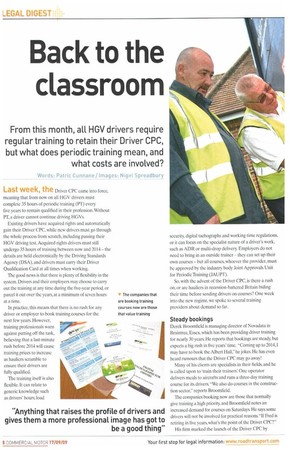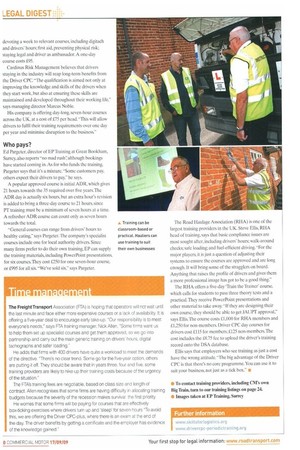Back to the classroom
Page 28

Page 30

If you've noticed an error in this article please click here to report it so we can fix it.
From this month, all HGV drivers require regular training to retain their Driver CPC, but what does periodic training mean, and what costs are involved?
Words: Patric Lunnane images: Niget spreadbur
Last week the Last week the
Driver CPC came into force, meaning that from now on all HGV drivers must complete 35 hours of periodic training (PT) every five years to remain qualified in their profession.Without PT, a driver cannot continue driving HGVs.
Existing drivers have acquired rights and automatically gain their Driver CPC, while new drivers must go through the whole process from scratch, including passing their HGV driving test. Acquired rights drivers must still undergo 35 hours of training between now and 2014— the details are held electronically by the Driving Standards Agency (DSA), and drivers must carry their Driver Qualification Card at all times when working.
The good news is that there is plenty of flexibility in the system. Drivers and their employers may choose to carry out the training at any time during the five-year period, or parcel it out over the years, at a minimum of seven hours at a time.
In practice, this means that there is no rush for ally driver or employer to book training courses for the next few years. However, training professionals warn against putting off the task, believing that a last-minute rush before 2014 will cause training prices to increase as hauliers scramble to ensure their drivers are fully qualified.
The training itself is also flexible. It can relate to generic knowledge such as drivers' hours, load security, digital tachographs and working time regulations, or it can focus on the specialist nature of a driver's work, such as ADR or multi-drop delivery. Employers do not need to bring in an outside trainer — they can set up their own courses — but all courses, whoever the provider, must be approved by the industry body Joint Approvals Unit for Periodic Training (JAUPT).
So, with the advent of the Driver CPC, is there a rush on, or are hauliers in recession-battered Britain biding their time before sending drivers on courses? One week into the new regime, we spoke to several training providers about demand so far.
Steady bookings Derek Broomfield is managing director of Novadata in Braintree, Essex. which has been providing driver training for nearly 30 years He reports that bookings are steady, but expects a big rush in five years' time. "Coming up to 2014,1 may have to book the Albert Hall," he jokes. He has even heard rumours that the Driver CPC may go away!
Many of his clients are specialists in their fields, and he is called upon to 'train their trainers: One operator delivers meals to aircrafts and runs a three-day training course for its drivers. "We also do courses in the construction sector." reports Broomfield.
The companies booking now are those that normally give training a high priority, and Broomfield notes an increased demand for courses on Saturdays. He says some drivers will not be involved for practical reasons. "If Fred is retiring in five years, what's the point of the Driver CPC?"
His firm marked the launch of the Driver CPC by devoting a week to relevant courses, including digitach and drivers' hours; first aid, preventing physical risk; staying legal and driver as ambassador. A one-day course costs £95.
Cardinus Risk Management believes that drivers staying in the industry will reap long-term benefits from the Driver CPC. "The qualification is aimed not only at improving the knowledge and skills of the drivers when they start work, but also at ensuring these skills are maintained and developed throughout their working life," says managing director Marcus Noble.
His company is offering day-long, seven-hour courses across the UK, at a cost of £75 per head. "This will allow drivers to fulfil their training requirements over one day per year and minimise disruption to the business."
Who pays?
Ed Pargeter, director of EP Training at Great Bookham, Surrey, also reports "no mad rush although bookings have started coming in. As for who funds the training, Pargeter says that it's a mixture. "Some customers pay, others expect their drivers to pay," he says.
A popular approved course is initial ADR, which gives 21 hours towards the 35 required over five years. The ADR day is actually six hours, but an extra hour's revision is added to bring a three-day course to 21 hours, since PT training must be a minimum of seven hours at a time. A refresher ADR course can count only as seven hours towards the total.
"General courses can range from drivers' hours to healthy eating," says Pargeter. The company's specialist courses include one for local authority drivers. Since many firms prefer to do their own training, EP can supply the training materials, including PowerPoint presentations, for six courses. They cost £250 for one seven-hour course, or £995 for all six. -We've sold six," says Pargeter. The Road Haulage Association (RHA) is one of the largest training providers in the UK. Steve Ellis, RHA head of training, says that basic compliance issues are most sought after, including drivers' hours; walk-around checks; safe loading; and fuel-efficient driving. "For the major players, it is just a question of adjusting their systems to ensure the courses are approved and are long enough. It will bring some of the stragglers on board. Anything that raises the profile of drivers and gives them a more professional image has got to be a good thing."
The RHA offers a five-day 'Train the Trainer' course, which calls for students to pass three theory tests and a practical.They receive PowerPoint presentations and other material to take away."If they are designing their own course, they should bc able to get JAUPT approval," says Ellis. The course costs £1,000 for RHA members and £1,250 for non-members. Driver CPC day courses for drivers cost £115 for members; £125 non-members. The cost includes the 0.75 fee to upload the driver's training record onto the DSA database.
Ellis says that employers who see training as just a cost have the wrong attitude. "The big advantage of the Driver CPC is that there's no core programme. You can use it to suit your business, not just as a tick box." •








































































































































